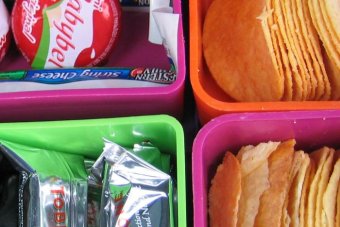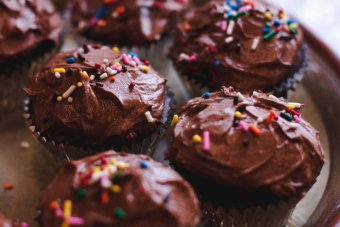Chocolate slice-shaming: Are we giving kids the wrong messages about food?
Updated
About 15 years ago, a message was sent home from my daughter's primary school teacher. It wasn't about chocolate slice. It was about her hair.
My then six-year-old's head was covered in tight, thick ringlets. While many clucked and cooed about her "gorgeous" hair, they didn't have to wash it, or try to get a brush through it.
It was an ordeal, one I approached with dread — she'd cry and flail about. And so it wasn't washed or brushed as often as more patient parents might have done.
(I also had two other children and a baby who needed attention.)
But then came the message from school: I must brush my daughter's hair. Apparently it was unacceptable to send her to school with hair unkempt.
I felt put down. We might have tried a bit harder. Or we might have gone on as usual until she was old enough to do it herself (which was more likely).
Still, that teacher was lucky I wasn't on social media in those days.
The story of my daughter's hair came rushing back to mind this week when my long-time friend posted on Facebook a note her three-year-old's kindergarten had sent home on the child's first day.
"Your child has 'chocolate slice' from the Red Food category today," the note, which featured a sad face, said. "Please choose healthier options for Kindy."
When I reposted her note, along with the message, "I told her to put in two slices tomorrow and tell them to get lost", I had no idea it would trigger such outrage.
It was shared hundreds of times, and was written up in news media outlets around the world.
Since then, I have been fielding media requests around the clock (will someone get me some bloody chocolate slice, please?!).
When 'organic, sugarless' muffins are sent home
The offending hedgehog slice (one mum, who texted in to 2UE, called it "satanic slice") had been homemade for a birthday celebration and, as per family tradition, leftovers went to school the next day.
I've known my friend for a quarter of a century — I know the kind of mum she is. She makes everything from scratch, including bread, and bakes like there's no tomorrow for her eight children.
Her kids are the kind who read books instead of watch TV. My friend and her husband both have degrees in health science — she is also a writer and researcher.
She felt bad that she had broken the rules.
 Photo:
Is it necessary to shame parents for what they put in the lunch box, asks Melinda Tankard Reist. (Flickr: Amancay Maahs)
Photo:
Is it necessary to shame parents for what they put in the lunch box, asks Melinda Tankard Reist. (Flickr: Amancay Maahs)
But the note — and condescending sad face on angry red paper — felt intrusive to me.
It could make children think that mummy and daddy had done something very wrong to receive something like that from their teacher.
Of course, I understand the importance of healthy eating policies. I appreciate that harried teachers are most likely just trying to carry out school policy (while also not being trained dieticians).
But I'm concerned about where this approach to eating takes us.
Since my post went viral, stories from similarly frustrated parents have flooded in.
I've been told of cases of children whose food was sent home uneaten — because it was not "approved" — and the child has had nothing to eat all day.
Organic, sugarless zucchini muffins; banana, almond meal and chia muffins; and homemade (nut-free) bliss balls have all been sent home.
Children have been told they were meant to have sandwiches, not muffins — even when their muffin could not have been healthier.
'I can't eat cake, Mum, it will make me fat'
Cupcakes — which had less sugar and calories than green-lit muesli bars — have also been sent home uneaten, according to one mum who did the calculations.
Another mother told me of a time when she'd sent her kid to school with a lunch box filled with apples, carrots, raisins and chicken … and a single, tiny chocolate egg, which the teacher promptly confiscated.
"My son was devo," she said. "Then after school [the teacher] lectured me about healthy lunches. I blew my head off!"
Some parents told of children hiding in the schoolyard to eat homemade cookies, afraid of being discovered. Others said their children were ashamed to eat treats even at home — hiding food and eating it privately away from the family.
One young girl had reportedly stopped eating chocolate cake in any context. "Mum, I can't eat chocolate cake because it will make me fat," she told her mother.
When children see food as "good" or "bad" it can set them up for eating disorders.
Some eating disorder specialists I work with say the bombardment of messages around obesity is causing food anxiety and contributing to disordered eating behaviour in children.
It's also worth considering the fact that many kids go to school without any food at all.
As Alice, who is training to be a primary teacher, wrote to me privately:
"I've seen kids come with no food at all on such a regular basis that every lunch time the teacher would collect uneaten food from other kids' lunch boxes to put into a snack drawer to feed those kids who came to school without."
She added: "It's great this school is concerned about what their students are eating, because it does affect their performance in the classroom.
"But I think they have lost perspective here. Is it necessary to shame parents for what they put in the lunchbox?"
My friend ended up digging out the kindergarten's food policy, which banned only "processed" cakes and biscuits. She hadn't broken the rules after all.
But it seems an important discussion has begun.
Hopefully it results in positive outcomes for parents, schools and — most importantly — children.
Topics: children, parenting, preschool, primary, child-health-and-behaviour, australia
First posted









